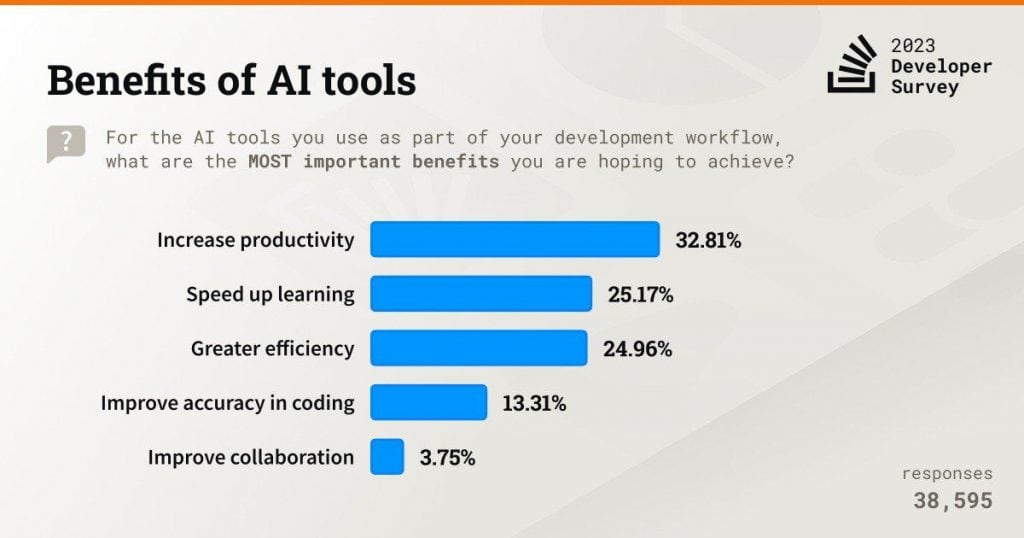Stack Overflow: 77% of Developers Expressed a Positive Attitude Towards Incorporating AI in Their Workflow


In Brief
A survey conducted by Stack Overflow revealed that 77% of developers expressed a positive attitude towards incorporating AI in their workflow, with 33% highlighting increased productivity and 42% trusting in the accuracy of AI tools.
In a recent survey conducted by Stack Overflow, developers from around the world shared their opinions on using AI in coding. With over 90,000 participants from 185 countries, the survey shed light on the perceptions and adoption of AI tools within the developer community.

| Recommended: 12 Best AI Coding Tools 2023 |
The survey revealed that 77% of respondents expressed a positive attitude towards incorporating AI in their workflow, with 70% already using or planning to use AI tools this year. When asked about the benefits, 33% highlighted increased productivity, while 25% emphasized quick learning. However, there were concerns regarding the accuracy of AI systems, which raised doubts and caution among some developers.

Trust in AI coding tools proved to be an area that requires attention, as only 3% of respondents expressed full trust, 39% had partial trust, 22% described themselves as distrustful, and 5% stated they had no trust at all.
Interestingly, the survey revealed that ChatGPT, the same AI tool being used to generate this article, was one of the most popular tools among respondents, with 83% utilizing it. However, not all developers were completely satisfied with this new partnership in their work.
The survey’s findings indicate a blend of curiosity and skepticism towards AI among developers. Stack Overflow acknowledges the importance of healthy skepticism when adopting new technologies, as thorough testing is necessary to ensure readiness for production.

Further exploration of the survey data reveals that 70% of respondents either currently use or plan to use AI tools in their development process. Among them, 44% are already leveraging AI tools, while an additional 26% have plans to adopt them in the near future. The majority, 77%, view the use of AI tools favorably in their development workflow, although there are differences observed between various groups.
Increased productivity emerged as the most important benefit of incorporating AI tools, according to 33% of respondents. Additionally, 42% expressed trust in the accuracy of the output generated by AI tools in their development process.
Interestingly, while approximately 30% of professional developers reported not currently using AI tools and having no plans to do so, those who were learning to code displayed a higher adoption rate. This discrepancy suggests that aspiring developers recognize the value of AI tools, likely due to their ability to facilitate faster learning. Professional developers, on the other hand, exercise caution, drawing from their experiences with past technology hype cycles and seeking concrete proof of value before embracing AI tools.


The survey data also revealed that the likelihood of using AI tools decreases as professional work experience increases. Developers with less than or equal to five years of experience were more inclined to adopt AI tools, while nearly 40% of developers with over 21 years of experience stated they did not plan on utilizing these tools.
Geographically, developers from India, Brazil, and Poland were found to be the most likely to use or plan on using AI tools in their development workflow. Conversely, developers from the UK, France, the US, and Germany exhibited a higher tendency to abstain from using AI tools.
Perceptions of AI tools align with the patterns observed among developers who either use or plan on using them. Site reliability engineers and security professionals had the highest percentage of unfavorable perceptions (6%), likely due to their awareness of potential risks associated with AI implementation.
When asked about the benefits of using AI tools, professional developers highlighted increased productivity as the most significant advantage (37.4%), followed by greater efficiency (27.9%) and accelerated learning (27.4%). Developers in the learning phase focused on the benefits of faster learning (42.4%) and increased productivity (41.5%), with greater efficiency (33.7%) being a secondary benefit.
Read more about AI:
Disclaimer
In line with the Trust Project guidelines, please note that the information provided on this page is not intended to be and should not be interpreted as legal, tax, investment, financial, or any other form of advice. It is important to only invest what you can afford to lose and to seek independent financial advice if you have any doubts. For further information, we suggest referring to the terms and conditions as well as the help and support pages provided by the issuer or advertiser. MetaversePost is committed to accurate, unbiased reporting, but market conditions are subject to change without notice.
About The Author
Damir is the team leader, product manager, and editor at Metaverse Post, covering topics such as AI/ML, AGI, LLMs, Metaverse, and Web3-related fields. His articles attract a massive audience of over a million users every month. He appears to be an expert with 10 years of experience in SEO and digital marketing. Damir has been mentioned in Mashable, Wired, Cointelegraph, The New Yorker, Inside.com, Entrepreneur, BeInCrypto, and other publications. He travels between the UAE, Turkey, Russia, and the CIS as a digital nomad. Damir earned a bachelor's degree in physics, which he believes has given him the critical thinking skills needed to be successful in the ever-changing landscape of the internet.
More articles

Damir is the team leader, product manager, and editor at Metaverse Post, covering topics such as AI/ML, AGI, LLMs, Metaverse, and Web3-related fields. His articles attract a massive audience of over a million users every month. He appears to be an expert with 10 years of experience in SEO and digital marketing. Damir has been mentioned in Mashable, Wired, Cointelegraph, The New Yorker, Inside.com, Entrepreneur, BeInCrypto, and other publications. He travels between the UAE, Turkey, Russia, and the CIS as a digital nomad. Damir earned a bachelor's degree in physics, which he believes has given him the critical thinking skills needed to be successful in the ever-changing landscape of the internet.



















































